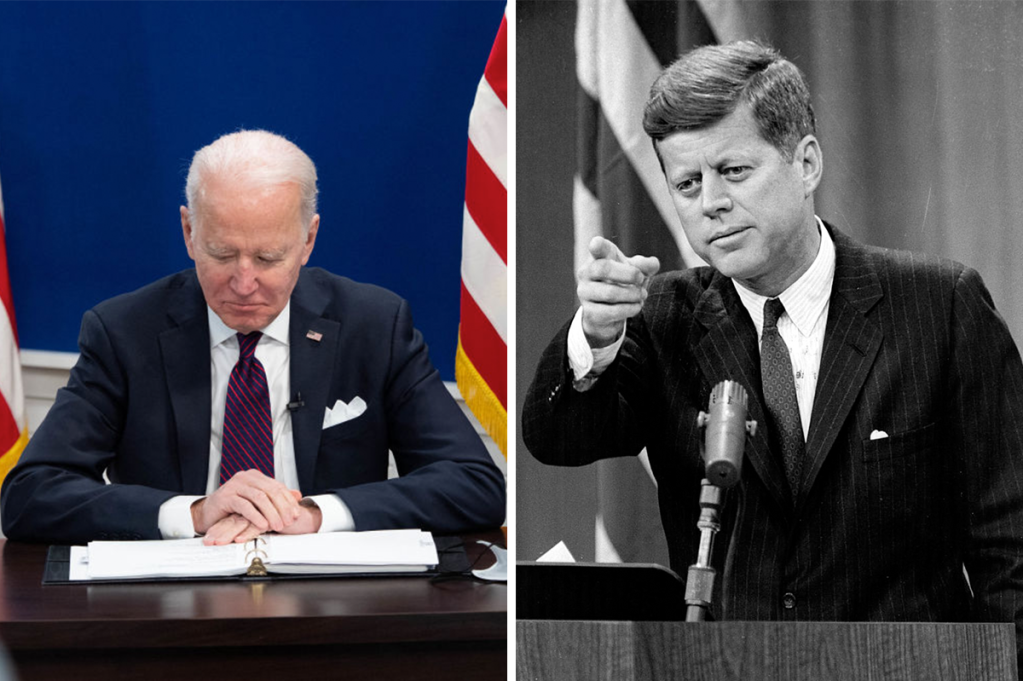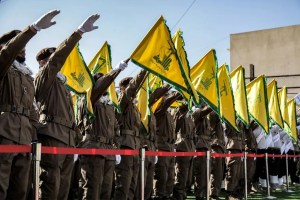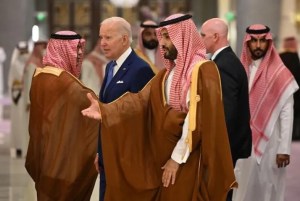As the Ukraine situation heats up, you can already picture the insider account Vice President Kamala Harris will publish one day in her 2025 bestseller Thirty-One Days in February.
But then, as any survivor of the Cuban Missile Crisis is bound to tell President Joe Biden, “I knew Jack Kennedy, Jack Kennedy was a friend of mine, and you, Joe Biden, are no Jack Kennedy.”
One of the clichés if not the myths about the Cuban Missile Crisis was that President Kennedy and Soviet leader Nikita Khrushchev were playing chicken and Khrushchev “blinked.” Under threat of potential nuclear war, he then decided to withdraw the Soviet nuclear missiles from Cuba.
We now know that what really happened was more complicated than the initial reports made it appear. In fact, JFK made a secret deal with Khrushchev to withdraw American missiles from Turkey in exchange for the removal of the Soviet ones from Cuba.
But then no one would deny that Kennedy had made it clear that he was ready to use the American military to force the Soviets to remove their missiles from Cuba even if that would trigger a nuclear exchange between the two superpowers. Khrushchev, after meeting with JFK in Vienna and concluding that he was “weak,” did not expect that to happen.
So even considering all the revisionist history of the 1962 crisis, the fact is that the man in the Kremlin did blink first. He recognized that his counterpart in the White House was ready to go to war, which could have led to the deaths not only of soldiers but perhaps of millions of American civilians.
This time around, it was the American president who blinked first. Joe Biden made it clear even before the Ukraine crisis started that the United States and its military allies would not go to war even if Russia decided to invade its neighbor.
In fact, during a news conference back in January, President Biden suggested that the US and its allies might not respond to what he called a “minor incursion” into Ukraine by Russia.
Biden’s team later tried to correct what was seen as one of his familiar gaffes. But then they reiterated that neither a minor nor a major Russian incursion into Ukraine would lead to an American military response, but at worst to economic sanctions.
Gaffe or not, Biden’s comment reflected the cost-effective assessment made by the administration and in a way by most Democrats and Republicans in Washington, that it was not in America’s national interest to go to war with Russia over Ukraine.
There were many reasons for that conclusion, including the recognition of the military and economic constraints on the US that have made the idea of an American intervention in Europe unrealistic.
The bottom line was that, unlike during the 1962 missile crisis or after Pearl Harbor, the American people would not support being drawn into what would become a very costly war to protect a country many of them could not even locate on a map.
The mood in the country in the aftermath of the military fiascos in Iraq and Afghanistan and against the backdrop of a fragile economic recovery, not to mention an ongoing pandemic, has made the idea of a war with Russia even more unlikely.
From that perspective, it could be said that Russian president Vladimir Putin had already won a major diplomatic victory early on and without firing a shot.
Recall that only a few months ago, we were being told that China had emerged as the major geostrategic and geoeconomic threat to the United States and that we were entering into another cold war.
Indeed, much of the focus in Washington in recent months has been on the frightening scenario under which the US is drawn into a war with China after it invades and annexes Taiwan.
Now…oops. All attention is being drawn back to Eastern Europe, and it is Russia, Putin and Ukraine 24/7. It is like Putin declaring, “You may have forgotten me, but, hey, I am back,” forcing Washington to reconsider his concerns.
And just as when the mainstream media made us believe that Putin had planted a mole by the name of Donald Trump in the White House, they are now playing into the hands of Russia’s corrupt leader by transforming him into an Evil Genius who threatens the liberal international order. That order apparently includes Poland, whose illiberal democratic leaders have also been likened to Putin.
In reality, Putin’s diplomatic and military moves, including his sending of troops into Ukraine — remember that “minor incursion?” — have helped him achieve his main strategic goal, which was to force the United States to reassess its post-Cold War policy of expanding the North Atlantic Treaty Organization towards Russia’s borders and challenging its interests in Europe.
President Biden and NATO leaders may deny it publicly, but their earlier pledges to invite Ukraine and Georgia to join the alliance have been parked in the something-we-plan-to-do-someday-but-not-now policy desk.
It should also be noted that after one of the last military confrontations between NATO and Russia, over the makeup of the former Yugoslavia, the West decided to establish the new state of Kosovo, which has yet to be recognized by the United Nations. That would be the status of the mini-states in Eastern Ukraine should Putin decide to launch them.
Against the backdrop of the Ukraine crisis, recalling the Cold War is perhaps instructive in this sense: if you think the US and NATO are betraying Ukraine and Georgia, consider that after World War Two the Western allies abandoned Poland, Hungary and Czechoslovakia as part of a division of Europe into spheres of influence.
The allies made that decision based on the recognition of the constraints operating on their military and economic power and the costs of a war with the Soviet Union, especially at a time when they were still fighting Japan.
The United States and its allies cannot simultaneously fight two full-blown wars with Russia and China, and the public is resistant to any new costly wars. Yet surely the notion that we can return to another Cold War-style situation with Europe divided into two separate blocs — a wall in the middle of Kyiv? — is not feasible.
Putin should recognize that the Americans are not going to agree to a Yalta II, and that after achieving his main goals he now needs to make a deal, not with NATO but with Ukraine. He should recognize its independence and withdraw Russian troops from its borders.
If that happens, Biden and his aides would probably declare victory while hawkish Republicans would accuse them of “appeasement.” But do not expect the next GOP president to deploy troops in Ukraine.


















